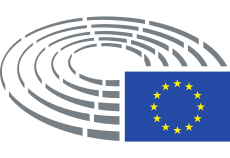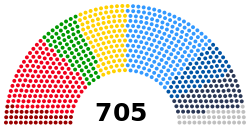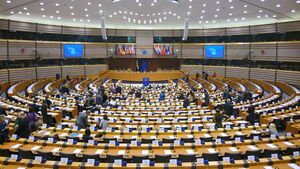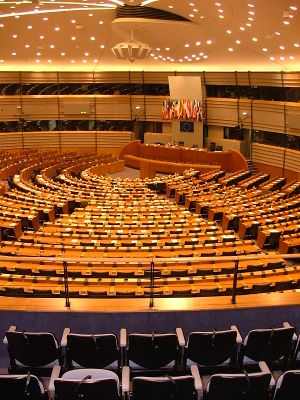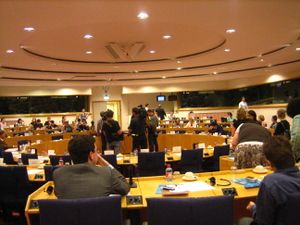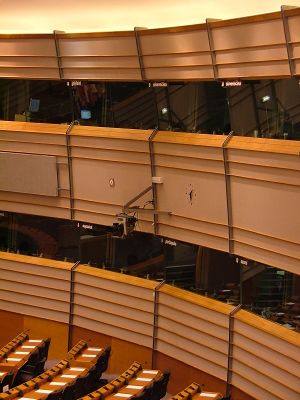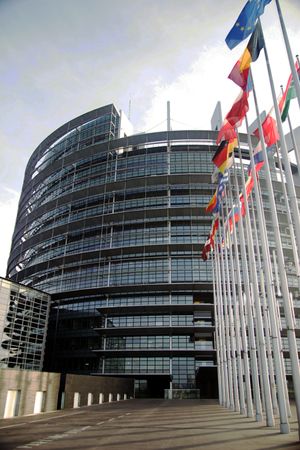البرلمان الاوروبي
البرلمان الأوروبي يعتبر واحدا من أقدم مؤسسات الوحدة الأوروبية، ويعود تاريخ تأسيسه إلى العام 1952، واختير لعضويته بالتعيين 78 من نواب برلمانات الدول الأوروبية، وكانت له حينذاك سلطات رمزية.
ويملك بعض الصلاحيات التشريعية و يعتبر الجهاز الرقابي والاستشاري في الاتحاد الأوروبي. يراقب عمل المفوضية الأوروبية ويوافق على أعضائها، يشارك بوضع القوانين، يصادق على الإتفاقات الدولية و على انضمام أعضاء جدد. كما يملك صلاحيات واسعة في مايتعلق بالميزانية المشتركة للاتحاد الأوروبي.
ويشكل البرلمان الأوروبي مع مجلس الاتحاد الأوروبي المكون من وزراء حكومات الدول الأعضاء، الجهاز التشريعي للاتحاد، ولا يمتلك البرلمان سلطة اقتراح أو صياغة مشاريع قوانين لأن هذا يندرج ضمن سلطة المفوضية الأوروبية.
التاريخ المعاصر
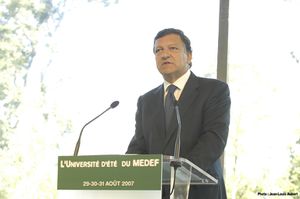
السلطات والوظائف
بالمقابل يمتلك البرلمان الأوروبي مجموعة من الصلاحيات الهامة منها إعداد وإقرار ميزانية الاتحاد والإشراف الرقابي عليها، والموافقة على رئيس وأعضاء المفوضية الأوروبية، وتعديل أو رفض ما تتقدم به المفوضية من مشروعات قوانين، وإصدار قرارات وتوصيات غير ملزمة.
كما يندرج ضمن صلاحيات البرلمان توجيه النقد للمفوضية أو إقالتها بأغلبية ثلثي النواب، وإقرار الاتفاقيات الخارجية للاتحاد الأوروبي، والتصديق على المنح والمساعدات المالية التي يقدمها الاتحاد لدول العالم المختلفة، ولا تتوفر للبرلمان آلية لمتابعة تنفيذ ما يصدره من قوانين وقرارات، تاركا هذه المهمة لبرلمانات الدول الأعضاء في الاتحاد.
الأعضاء
|
يتكون البرلمان بموجب معاهدة نيس من 732 مقعدا موزعة على الدول أعضاء بشكل من 27 دولة يتناسب مع عدد سكانها. يقوم مواطنو كل دولة من الدول الأعضاء باختيار ممثليهم في البرلمان ابتداء من العام 1979 عن طريق انتخابات مباشرة تتم كل 5 سنوات. ويعبر البرلمان الأوروبي عن اهتمامات 490 مليون نسمة يشكلون سكان الاتحاد الأوروبي.
يفرض عدد المقاعد المحدد لكل دولة على النواب من الدول المختلفة التجمع ضمن تيارات حسب انتماءاتهم السياسية الحزبية. يتم التصويت وفق مبدأ الأغلبية.
وبعد إقرار اتفاقية ماستريخت (1992) ولشبونة (2007) لمعايير الوحدة الأوروبية، اتفقت دول الاتحاد الأوروبي على زيادة عدد نواب البرلمان الأوروبي إلى 750 عضوا، إضافة لرئيس البرلمان، في الانتخابات القادمة المقررة عام 2014، كما جرى أيضا الاتفاق على خفض الحد الأقصى لمقاعد أي دولة في البرلمان من 99 إلى 96 مقعدا، ورفع الحد الأدنى من 5 إلى 16 مقعدا.
وتعتبر ألمانيا الآن بحكم عدد سكانها البالغ 82 مليون نسمة، الدولة ذات العدد الأكبر من المقاعد في البرلمان الأوروبي، غير أن هذا العدد سينخفض عند تنفيذ التعديلات الجديدة بعد ثلاثة أعوام.
ويبتعد البرلمان الأوروبي عن الأشكال الموجودة في البرلمانات التقليدية من أحزاب حكومة ومعارضة، وتنتظم داخله سبع كتل برلمانية رئيسية تنتمي إلى 116 حزبا أوروبيا، كما يضم البرلمان في صفوفه 30 عضوا من المستقلين.
ومن أهم الكتل البرلمانية الموجودة بالبرلمان الأوروبي اتحاد الأحزاب الشعبية الأوروبية المعبرة عن الأحزاب المسيحية المحافظة، وتحالف الأحزاب الاشتراكية الديمقراطية، وتحالف أحزاب البيئة الخضراء، واتحاد الأحزاب الليبرالية.[1]
الجماعات السياسية
قالب:Political groups of the European Parliament (7th)
الانتخابات

| Radical Alliance (Liberals) |
الجلسات
اللجان والبعثات
الترجمة
المقر
يقع مقر البرلمان الأوروبي في ستراسبورگ لكنه يعمل أيضا فيلوكسمبورغ, وينعقد 48 يوما في العام، كما تنعقد في بروكسلمعظم الجلسات العامة واجتماعات اللجان.
انظر أيضا
المصادر
- ^ البرلمان الأوروبيالجزيرة نت
قراءات إضافية
- Attwool, Elspeth (2000). To the Power of Ten: UK Liberal Democrats in the European Parliament (Centre for Reform Papers). Centre for Reform. ISBN 978-1902622170.
- Butler, David (2005). British Politics and European Election. London: Palgrave Macmillan. ISBN 978-1403935854.
{{cite book}}: Unknown parameter|coauthors=ignored (|author=suggested) (help) - Farrell, David (2007). Representing Europe's Citizens?: Electoral Institutions and the Failure of Parliamentary Representation. Oxford University Press. ISBN 978-0199285020.
{{cite book}}: Unknown parameter|coauthors=ignored (|author=suggested) (help) - Gazzola, Michele (2006). "Managing Multilingualism in the European Union: Language Policy Evaluation for the European Parliament". Language Policy. Netherlands: Springer. 5 (4): 393–417. doi:10.1007/s10993-006-9032-5.
- Corbett, Richard; [|Jacobs, Francis]; Shackleton, Michael (2007), The European Parliament (7 ed.), London: John Harper Publishing, ISBN 978-0955114472, http://www.johnharperpublishing.co.uk/pp007.shtml
- Hix, Simon (2007). Democratic Politics in the European Parliament (Themes in European Governance). Cambridge: Cambridge University Press. ISBN 978-0521694605.
{{cite book}}: Unknown parameter|coauthors=ignored (|author=suggested) (help) (draft version on-line) - Hoskyns, Catherine (2000). Democratizing the European Union: Issues for the twenty-first Century (Perspectives on Democratization. Manchester University Press. ISBN 978-0719056666.
{{cite book}}: Unknown parameter|coauthors=ignored (|author=suggested) (help) - Judge, David (2003). The European Parliament (European Union). London: Palgrave Macmillan. ISBN 978-0333598740.
{{cite book}}: Unknown parameter|coauthors=ignored (|author=suggested) (help) - Kreppel, Amie (2001). The European Parliament and Supranational Party System: A Study in Institutional Development (Cambridge Studies in Comparative Politics). Cambridge: Cambridge University Press. ISBN 978-0521000796.
- Van der Laan, Lousewies (2003). The Case For a Stronger European Parliament. London: Centre for European Reform. ISBN 1901229491.
- Lodge, Juliet (200-04-18). The 2004 Elections to the European Parliament. London: Palgrave Macmillan. ISBN 978-1403935182.
{{cite book}}: Check date values in:|date=(help) - Maier, Michaela; Tenscher, Jens (2006). Campaigning in Europe, Campaigning for Europe: Political Parties, Campaigns, Mass Media and the European Parliament Elections 2004 (Medien). Lit Verlag. ISBN 978-3825893224.
- Rittberger, Berthold (2007). Building Europe's Parliament: Democratic Representation Beyond the Nation State. Oxford University Press. ISBN 978-0199231997.
- Schmitter, Philippe (2000). How to Democratize the EU ... and Why Bother? (Governance in Europe). Rowman & Littlefield Publishers. ISBN 978-0847699056.
- Scully, Rodger (2005). Becoming European?: Attitudes, Behaviour, and Socialization in the European Parliament. Oxford University Press. ISBN 978-0199284320.
- Smith, Julie (1999). Europe's Elected Parliament (Contemporary European Studies). London: Continuum International Publishing Group. ISBN 978-0333598740.
- Steuenberg, Bernard (2002). The European Parliament on the Move: Toward Parliamentary Democracy in Europe (Governance in Europe). Rowman & Littlefield Publishers. ISBN 978-0742501263.
{{cite book}}: Unknown parameter|coauthors=ignored (|author=suggested) (help) - Watson, Graham (2004). EU've Got Mail!: Liberal Letters from the European Parliament. Baghot Publishing. ISBN 978-0954574512.
- Wood, David M. (2007). The Emerging European Union (4th Ed.). Pearson Longman. ISBN 0-321-43941-4.
{{cite book}}: Unknown parameter|coauthors=ignored (|author=suggested) (help)
وصلات خارجية
| البرلمان الاوروبي
]].- الموقع الرسمي
- europarltv: official webtv of the European Parliament
- Live streaming debate
- Previous recorded debates
- Session information
- Legislative Observatory
- Official Register of MEPs
- Rules of Procedure
- Offices in Member states
- EP Fact Sheets
- Eurela Election News
- Supranational party system
- BBC Parliament guide
- Robert Schuman, the history and purpose of the European Community and the supranational method.
- 360º tour of European Parliament Brussels
- Tracking the votes at the European Parliament
- Pages using gadget WikiMiniAtlas
- Articles containing بلغارية-language text
- Articles containing كرواتية-language text
- Articles containing تشيكية-language text
- Articles containing دنماركية-language text
- Articles containing هولندية-language text
- Articles containing إنگليزية-language text
- Articles containing إستونية-language text
- Articles containing فنلندية-language text
- Articles containing فرنسية-language text
- Articles containing ألمانية-language text
- Articles containing Greek-language text
- Articles containing مجرية-language text
- Articles containing أيرلندية-language text
- Articles containing إيطالية-language text
- Articles containing لاتڤية-language text
- Articles containing لتوانية-language text
- Articles containing مالطية-language text
- Articles containing پولندية-language text
- Articles containing برتغالية-language text
- Articles containing رومانية-language text
- Articles containing سلوڤاكية-language text
- Articles containing Slovene-language text
- Articles containing إسپانية-language text
- Articles containing سويدية-language text
- Infobox legislature with background color
- Articles with hatnote templates targeting a nonexistent page
- CS1 errors: unsupported parameter
- Coordinates not on Wikidata
- مقالات مميزة
- البرلمان الاوروبي
- اتحاد أوروبي
